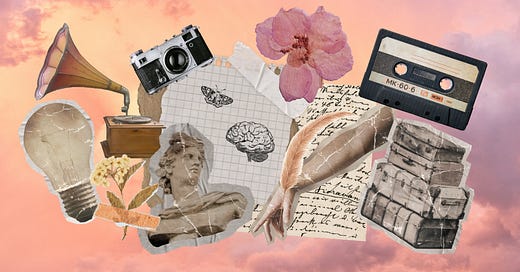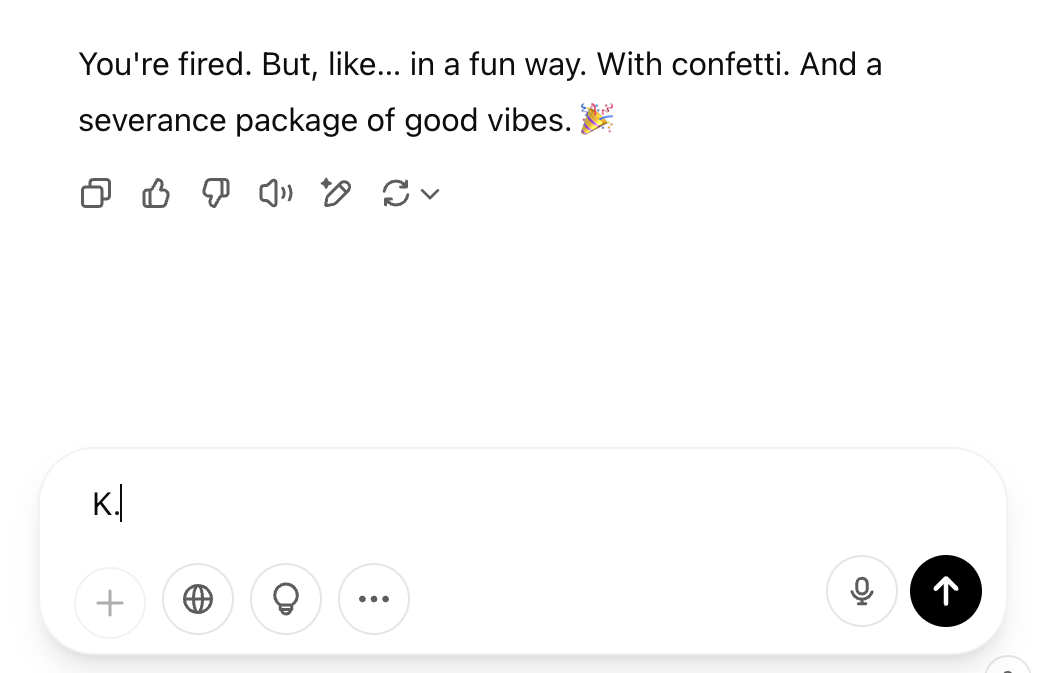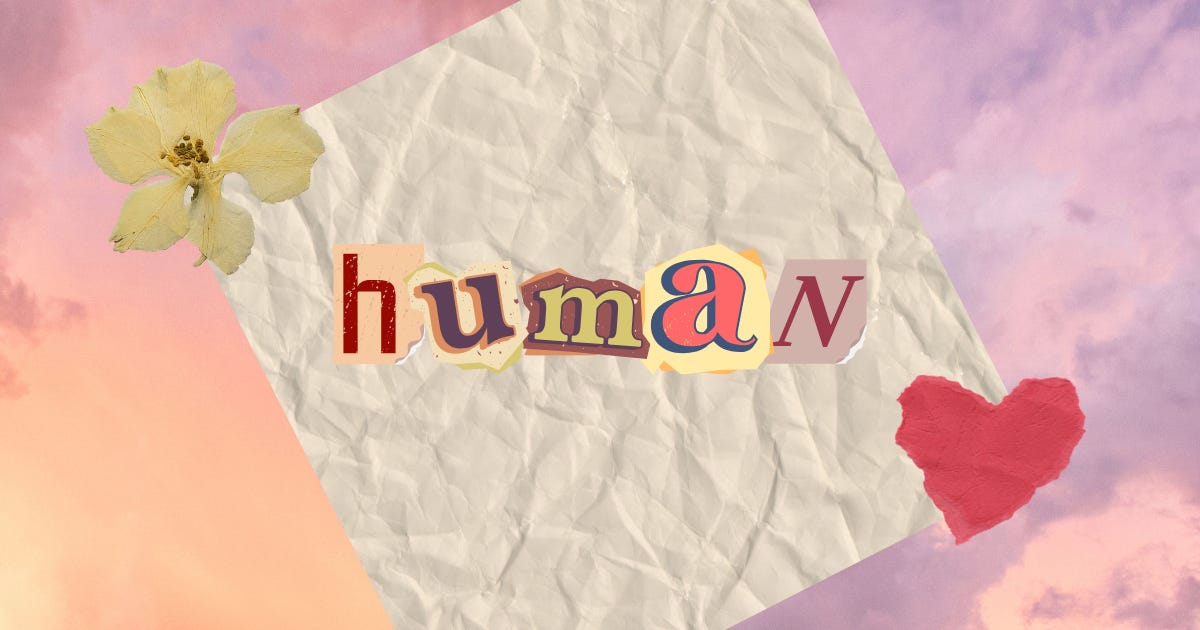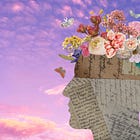I remember the moment clearly: After spending years honing my craft as a content writer—learning marketing and copywriting, developing my voice, and researching specialized topics—I opened ChatGPT and prompted it to write something similar to what had just taken me several hours to create.
The result was unsettling, not because it was perfect, but because it was good enough.
In fact, it was so good that with minor edits, it could potentially replace days of my work. So good that clients might wonder why they were paying premium rates for human-created content.
We've been conditioned to believe that experience compounds in value, and that the more years we invest in developing specialized skills, the more we'll be rewarded professionally. This promise of increasing returns is precisely why specialization has been so highly prized in our economy.
Yet with the emergence of sophisticated AI, I found myself questioning whether all those years had become obsolete—overnight.
The specialized path I'd been following now seemed to lead nowhere.
The Reckoning
When ChatGPT came out, I was employed as a content manager. I’ve always been a bit of a technology fangirl, so I was eager to integrate these new tools into my workflow.
AI added a whole new dimension to my creative process, but along with that came an interesting change in the workplace dynamics around me.
Conversations that once celebrated my contributions now carried an undertone of impatience. Leaders who had previously praised my creativity and insights now spoke about AI's efficiency, their eyes calculating my worth against an algorithm's output.
All of a sudden, I felt like I was expected to mimic the machine—not the other way around.
Umm…no thanks!
Long story short, I was fired.
Truth be told, I've always felt a not-so-subtle resistance to committing to a singular field of specialization. The content and marketing-related jobs I'd taken over the years were ultimately a means to an end—reliable solutions for supporting a location-independent lifestyle (a story for another post).
This inability (or perhaps unwillingness) to specialize isn't anything new for many creatives, though: Multi-passionate people have long struggled in systems designed for one-track experts.
A Creative’s Dilemma (Well, One of Many)
The big difference now is that AI has brought this dilemma into sharp focus.
Resisting being pigeon-holed since forever, I’ve always found ways to expand my creative reach and transcend job description limitations. For example, I’d take simple content writing tasks and expand them into video projects, podcast content, graphics, or social posts. I’d design content maps and craft visual narratives where I was expected to simply analyze dry marketing metrics—and complete other mundane tasks that made me yawn harder than your pet does after a long day of doing absolutely nothing.
(Freeloader!)
The bottom line is this: While experts and status quo managers preached the gospel of specialization, I found my creative spark in interdisciplinary work.
My mind simply didn't operate like a factory or a filing cabinet; It thrived on the connections between things—and for me, that meant music, visual storytelling, writing, travel, and technology.
This renaissance approach, which I spent many years fearing might be a professional liability, may have inadvertently prepared me for the technological shift we're now experiencing.
The quality that would most definitely frustrate the average corporate traditionalist just might turn out to be a lifeline.
As AI continued to evolve and my career trajectory repositioned, I began to see that in addition to being my own personal dilemma, this was a fundamental change in how creative value would be defined in the coming years.
The question was how to leverage uniquely human capabilities that algorithms couldn't easily replicate.
Beyond Replication: Reimagining Creative Value
Watching AI tools rapidly approximating creative skills I'd spent years perfecting made it difficult to accurately assess my bargaining power or future career prospects. Whether it was content writing, video editing, voiceover, or music production, it felt like everything I had worked so hard for was now vulnerable to digital replication.
I’d already lost jobs, clients, and any sense of secure footing I had built for myself.
Like many creatives facing technological disruption, my initial reaction cycled through denial, frustration, and fear. I questioned: Is my creative path even sustainable? Which of my skills (if any) will be relevant in a few years? Or five? Ten?
Everyone I talked to shared my sentiments, including programmers, small business owners, writers, creative freelancers, and other musicians.
After a lot of discussion, contemplation, and experimentation, I concluded:
The qualities that make us distinctly human—our ability to integrate knowledge across domains, infuse technical skills with emotional intelligence, and make abstract connections—may actually be our greatest assets in an AI-powered world.
At least, for now.
This conclusion has brought me full circle, right back to my natural predisposition toward multifaceted creativity—a new (yet old) model for creating value in a modern, AI-driven world.
The Renaissance Model: A Blueprint for Adaptive Creativity
Renaissance thinking is an approach that values breadth alongside depth, cultivating knowledge across multiple domains while finding meaningful connections between them. It embraces curiosity, questions conventional wisdom, and celebrates direct observation and exploration.
The original Renaissance was more than an artistic movement—it was a radical reimagining of human potential. While polymaths like Leonardo da Vinci worked impressively across disciplines, it was the way they saw the world that was groundbreaking.
They saw beauty in connecting ideas, not separating them. Where others built walls between subjects, they created doorways.
Da Vinci wasn't confined to being an 'anatomist,' 'painter,' or 'engineer.' His notebooks, with scientific diagrams alongside artistic studies, reveal a mind that deliberately sought connections between fields.
Each piece of work was simultaneously an artistic expression, a scientific inquiry, and a technological innovation—all in one.
While there’s only one Da Vinci, I believe there are countless people across the globe who have this general predisposition. Maybe you’re one of them, and maybe you’ve felt as frustrated as I’ve felt with the one dimensional, hyper-specialist fixation that has dominated society for so long.
When it comes to people with multiple passions or disparate interests, the "jack of all trades, master of none" criticism comes to mind. The thing is, this perspective fundamentally misunderstands the nature of expertise in a complex world.
Being multi-passionate isn't about shallow dabbling, but about developing deep, interconnected understanding. It's about cultivating the ability to see patterns and make connections that specialists often miss.
A polymath doesn't just know a little about many things; they develop profound insights by understanding how different domains speak to each other.
I'm not suggesting everyone must become a polymath, but I am suggesting that there’s unmistakeable value in expanding beyond a single specialty to create unique combinations that reflect your authentic interests and strengths.
The game has changed. Renaissance thinking is back.
What's Next?
This is Part 1 of my three-part series on renaissance thinking in the age of AI. If this post resonates with you, I invite you to join New Renaissance Tribe—a weekly newsletter and growing community for modern creators, explorers, builders, and meaning-makers.
Read more about New Renaissance Tribe here, or subscribe below to join our movement of renaissance thinkers reimagining what's possible in this age of algorithmic creation.
Part 2 of this series, "The Integration Advantage", explores why renaissance thinking goes beyond simple generalism—and provides practical examples of its advantages in an AI-driven world.
Now, let’s hear from you: Have you experienced similar concerns about AI replicating your professional skills? Or have you always been drawn to renaissance thinking, even when it wasn't the popular approach?
Share your thoughts in the comments below.









This comment was written with AI